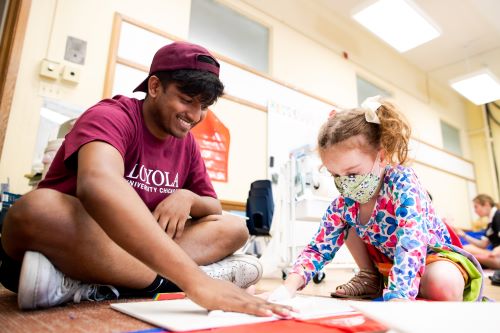Pathways to Engagement

Pathways to Engagement
Pathways of Public Service and Civic Engagement
The Center for Engaged Learning, Teaching, & Scholarship in collaboration with Stanford University and 17 other universities are implementing the Pathways of Public Service and Civic Engagement in various classes and campus wide programming.
The Pathways of Public Service describe a range of possibilities by which Loyola University can make a contribution to the common good and provide the “big tent” for the programs Loyola University Chicago in collaboration with Stanford University’s Haas Center delivers and supports. These pathways intersect and overlap, demonstrating the interdependent nature inherent in working toward the common good. There is no single path, people move in and out of these pathways over time and that they are issue-based rather than discipline bound (Wagner 2006; Zimmerman & Zahniser 1991; Watts, Griffith, & Abdul-Adil, 1999; Minnesota Campus Compact Social Change Wheel 1996).
The Six Pathways included in the Stanford Haas Center’s strategic plan are:
- Community Engaged Learning and Research: Connecting coursework and academic research to community-identified concerns to enrich knowledge and inform action on social issues
- Community Organizing and Activism: Involving, educating, and mobilizing individual or collective action to influence or persuade others
- Direct Service: Working to address the immediate needs of individuals or a community, often-involving contact with the people or places being served.
- Philanthropy: Donating or using private funds or charitable contributions from individuals or institutions to contribute to the public good.
- Policy and Governance: Participating in political processes, policymaking, and public governance.
- Social Entrepreneurship and Corporate Social Responsibility: Using ethical business or private sector approaches to create or expand market-oriented responses to social or environmental problems.
Examples of Pathways
- Volunteering with a local organization that distributes food to the homeless and develops and harvests community gardens to increase the capacity to reach more people
- Joining a community health center in their legislative advocacy efforts in Chicago to ensure that mental health services continue to be funded.
- Working with a local philanthropic foundation to develop a monitoring and evaluation tool for their grantees
- Meeting with and writing letters to local legislators to create support behind a ballot initiative and/or assisting a representative running for public office.
- Tutoring immigrant elementary school students in English
Additional Resources for Pathways:
To view Stanford’s Pathways of Public Service and Civic Engagement video click here
For a list of Recommended Organizations for which you can provide service, academic internships, and/or research click here.
For more information, contact the Center for Engaged Learning, Teaching, & Scholarship staff members, Associate Director Susan Haarman, shaarman@luc.edu.
Is there something missing, you want added to this page? Let us know and we'll add it here.
Pathways to Engagement
Pathways of Public Service and Civic Engagement
The Center for Engaged Learning, Teaching, & Scholarship in collaboration with Stanford University and 17 other universities are implementing the Pathways of Public Service and Civic Engagement in various classes and campus wide programming.
The Pathways of Public Service describe a range of possibilities by which Loyola University can make a contribution to the common good and provide the “big tent” for the programs Loyola University Chicago in collaboration with Stanford University’s Haas Center delivers and supports. These pathways intersect and overlap, demonstrating the interdependent nature inherent in working toward the common good. There is no single path, people move in and out of these pathways over time and that they are issue-based rather than discipline bound (Wagner 2006; Zimmerman & Zahniser 1991; Watts, Griffith, & Abdul-Adil, 1999; Minnesota Campus Compact Social Change Wheel 1996).
The Six Pathways included in the Stanford Haas Center’s strategic plan are:
- Community Engaged Learning and Research: Connecting coursework and academic research to community-identified concerns to enrich knowledge and inform action on social issues
- Community Organizing and Activism: Involving, educating, and mobilizing individual or collective action to influence or persuade others
- Direct Service: Working to address the immediate needs of individuals or a community, often-involving contact with the people or places being served.
- Philanthropy: Donating or using private funds or charitable contributions from individuals or institutions to contribute to the public good.
- Policy and Governance: Participating in political processes, policymaking, and public governance.
- Social Entrepreneurship and Corporate Social Responsibility: Using ethical business or private sector approaches to create or expand market-oriented responses to social or environmental problems.
Examples of Pathways
- Volunteering with a local organization that distributes food to the homeless and develops and harvests community gardens to increase the capacity to reach more people
- Joining a community health center in their legislative advocacy efforts in Chicago to ensure that mental health services continue to be funded.
- Working with a local philanthropic foundation to develop a monitoring and evaluation tool for their grantees
- Meeting with and writing letters to local legislators to create support behind a ballot initiative and/or assisting a representative running for public office.
- Tutoring immigrant elementary school students in English
Additional Resources for Pathways:
To view Stanford’s Pathways of Public Service and Civic Engagement video click here
For a list of Recommended Organizations for which you can provide service, academic internships, and/or research click here.
For more information, contact the Center for Engaged Learning, Teaching, & Scholarship staff members, Associate Director Susan Haarman, shaarman@luc.edu.
Is there something missing, you want added to this page? Let us know and we'll add it here.
